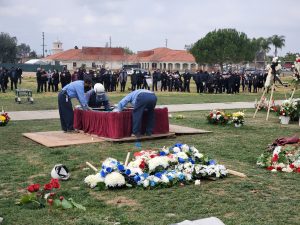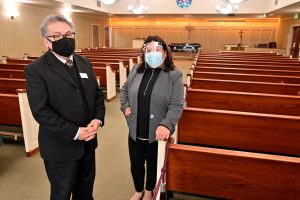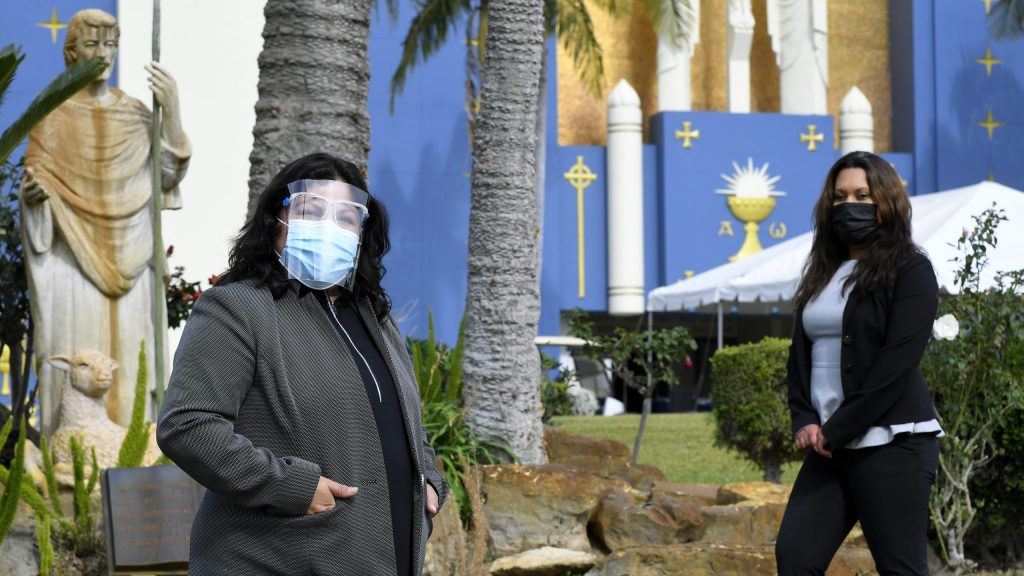Once their obligatory wellness and temperature checks are done, employees at All Souls Catholic Cemetery and Mausoleum in Long Beach begin their morning meeting with a special prayer.
“Into your hands, oh Lord, we humbly entrust our brothers and sisters,” they begin.
It is a morning ritual that in the wake of Southern California’s COVID-19 winter surge, prepares the staff — among them counselors, embalmers, and maintenance staff — to face human grief and tragedy on a scale that no job training could have prepared them for.
“Our cemeteries and funeral homes are experiencing double or more in the number of at-need services,” explained Brian McMahon, director of community outreach for the Catholic Cemeteries and Mortuaries of the Archdiocese of Los Angeles. “The impact has been seen through all eleven cemeteries and six mortuaries in Los Angeles, Ventura, and Santa Barbara Counties.”
They stand on what you might call “the other side” of the pandemic: the funeral arrangers, the cemetery workers, the people at the ready to help grieving families at LA’s Catholic cemeteries. Since the start of the pandemic in early 2020, but especially in the recent winter months, they have been dealing with an unprecedented situation that has strained their physical, mental, and spiritual resources.
MaryAnn McAdams, who oversees operations at All Souls, recalled overhearing one of her employees talking on the phone with a friend on a recent morning.
“I feel overwhelmed just walking in here,” the person said as they arrived at work for their wellness check at the gate.
McAdams understands the feeling.
“Sometimes it is hard to get up in the morning and come to work, but we are here willingly,” she said.
“We know what we are getting into every day. My staff are the real heroes and it’s not just for the paycheck, it can’t be just that,” McAdams said. “It really is all for the glory of God.”

Then there is the “new normal” of last goodbyes during the COVID-19 pandemic.
“The whole world has a broken spirit,” said Ramon Núñez, manager of Holy Cross Catholic Mortuary in Culver City.
It worries and saddens Núñez that COVID-19 restrictions have also made it more difficult for families, going through unimaginable pain, to say a proper goodbye to their loved ones. It has made it harder for the cemeteries to make those families feel welcome, and be surrounded by people dedicated to serving them with empathy, sensitivity, and efficiency in the process available in more normal times.
“Just imagine not to be able to celebrate a person’s life in the way that they were accustomed to,” said Núñez.
Suddenly gone are the large funerals with 150 or 200 family members, the mariachi band offering favorite songs at the graveside. Technically, only 30 family members are allowed at the service and, for much of the winter surge, funeral Masses were held outside under a tent with limited and socially distanced seating.
Gone are the typical rituals of death and final farewells that allow families to start the grieving process surrounded by others.
“There’s generally no vigil, or “velorio,” of the deceased or it’s just limited to 30 minutes for a quick viewing of the body, and then we celebrate the Mass and go to the burial site,” recounted Núñez. “That’s where people gather and tell stories about the person; it’s like a celebration of that life. But that is no longer possible.”

On a recent February morning at All Souls, mourners gathered to witness one of several burials that day. All are masked and spread out, as best as their emotions will allow. The actual burial is happening further away, workers lowering the casket on the ground. There’s no gathering around or throwing handfuls of soil, or that last rose on top of the wooden coffin before it disappears inside the ground.
Some of the deceased are showing up with no family members. They are alone and make the arrangements beforehand.
“We make time and go to the gravesite services to be there for that person,” explained McAdams about such cases. “Those funerals impact us greatly.”
At the beginning of the pandemic, cemetery grounds were closed, and visits not allowed — only burials with immediate family present were possible — something that was very hard on the families, many of whom were not able to be with their loved ones in the hospital as they lay dying.
Eventually, the rules changed and cemetery gates opened again for visits.
“One of the happiest days was when we were able to open our gates for about three hours a day,” said McAdams. “The families then could come and visit, spend time with their loved ones; it is comforting to them, that’s why we are here.”
But while the cemetery restrictions have relented, the flow of cases has not, especially during the recent winter surge. Recently, All Souls hosted 17 burials in a single day. Burials are up by at least 50% compared to pre-COVID-19 times. In mid-February, there were some 200 families waiting to finalize burial plans at the cemetery. To make things even harder, the required government paperwork for burials is taking longer to arrive than before the pandemic.
At Holy Cross in Culver City, about 80 families were waiting for their loved one’s burial. Any past January, the cemetery averaged 90 burials. This year it was 150.

The tragic personal stories, however, are the most heart-wrenching McAdams and Nuñez have experienced in their decades of ministry. They both agree they have never seen anything like this.
“Today we have two different families that are burying mother and daughter,” said McAdams. “We have seen brothers buried at the same time because they were together at a function where they got infected. These families are completely broken, you can’t blame them … we live these stories daily.”
A woman showed up at one of the cemeteries and told her story to the counselor. She had just lost her husband and was left with five kids, the youngest of which was 6 years old. He went into the hospital and 16 days later he was dead. The woman sat across the table, an acrylic screen separating her from the counselor, everyone masked and distanced, telling of her complete shock.
“I don’t get it, I don’t get it,” she said to the counselor. “I dropped him off at the hospital and now he is dead, I never saw him again.”
Most families are appreciative of any efforts to ease their pain.
“For the majority of families, their faith is the crux of their arrangement; to provide Catholic burials to families is so important, they call us back and thank us for making things a little bit easier,” said McAdams.
At both cemeteries, there are still many families to serve and staff is usually short. Jobs are harder to fill, said Núñez, due to disinformation about the risk of the job, which he says is more mental and spiritual than physical, given the precautions taken.
The cemetery staff live their own tragedies as well. Many have endured illness and family deaths of their own during the pandemic. And every day they go home after dealing with the tragedies of others to face their own challenges.

“My mother and father were both in the ministry [cemeteries] and this is something I don’t ever remember experiencing,” said McAdams. “I know my staff sometimes just needs a day to breath fresh air, because we never want to be callous, but be clothed in mercy and compassion.”
The restrictions around the services frustrate the cemetery workers for whom this work is part of their ministry.
“As the manager, I attest to that this is not who we are. We want to give the maximum comfort and empathy and provide a bridge of hope,” said Núñez, who is a deacon. “But that bridge is very short at the moment.”
Managers have small gestures toward employees: they leave a bottle of water on their desk and make sure they have something to eat. They push caskets or sell flowers if someone calls in sick and they meet with families and listen to their stories as counselors would.
“I try to be here, be available, show the support, the understanding, the appreciation,” said Núñez. “Everybody here is giving their lives, postponing our lives because of the pandemic. My job is to be the cheerleader for my staff, to look for the light at the end of the tunnel.”
But both Núñez and McAdams point to their employees as the real heroes who sacrifice the most to meet the needs of the families. They are the “last responders,” doing their part at the other end of the battle against the pandemic.
“We pray for the families and also for ourselves, to be able to get through the day,” said McAdams. “I see every single one of my employees as a hero, because they are tirelessly coming in every day, not knowing what to expect.”

